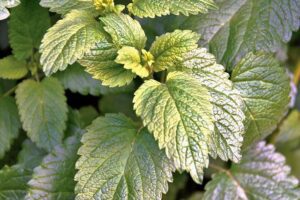 Lemon Balm: Study shows this herb has a sedative effect on the central nervous system. The oil of seems to inhibit bacteria and viruses. It is a very gentle herb with a mint-like flavor. It has been used as a tea to treat many children’s disorders such as colds and flus.
Lemon Balm: Study shows this herb has a sedative effect on the central nervous system. The oil of seems to inhibit bacteria and viruses. It is a very gentle herb with a mint-like flavor. It has been used as a tea to treat many children’s disorders such as colds and flus.
Traditional medicine considers lemon balm as a digestive tonic and a sleep aid. If you are under mental stress, taking lemon balm helps to improve relaxation, memory, and attentiveness.
It relieves anxiety and tension and is an excellent digestive relaxant. The Commission E approved the internal use of lemon balm for nervous sleeping disorders and functional gastrointestinal complaints. German Standard License for lemon balm tea approves it for nervous disorders of sleep and of the gastrointestinal tract, and to stimulate the appetite.
Folklore:
It “causeth the mind and heart to become merry… and driveth away all troublesome cares and thoughts of of the mind, arising from melancholy and black choler.. “British herbalist, Nicholas Culpepper, mid-seventeenth century.
Lemon Balm was a symbolic plant used to transmit messages between lovers and also signified sympathy.
The Plant:
Latin name Melissa officinalis. It is a loosely branched, upright perennial that attracts attention by its scent rather than appearance. It is a member of the mint family. It has square stems and has two-lipped white or yellowish tubular flowers in clusters. Touch the leaves and your fingers will smell of lemon with a hint of mint. Native to southern Europe and North Africa, it now grows wild and is cultivated throughout the world.
It grows to a maximum height of 1 m (3 ft 3 in). The leaves have a mild lemon scent. During summer, small white flowers full of nectar appear. It is not to be confused with bee balm (genus Monarda), although the white flowers attract bees, hence the genus Melissa (Greek for “honey bee”).
Dosage:
Unless otherwise prescribed: 1.5–4.5 g cut herb several times daily, as needed. Note: Combinations with other sedative and/or carminative herbs may be beneficial. Infusion: 1.5–4.5 g in 150 ml water. Fluid extract 1-1 (g/ml): 1.5–4.5 ml.
